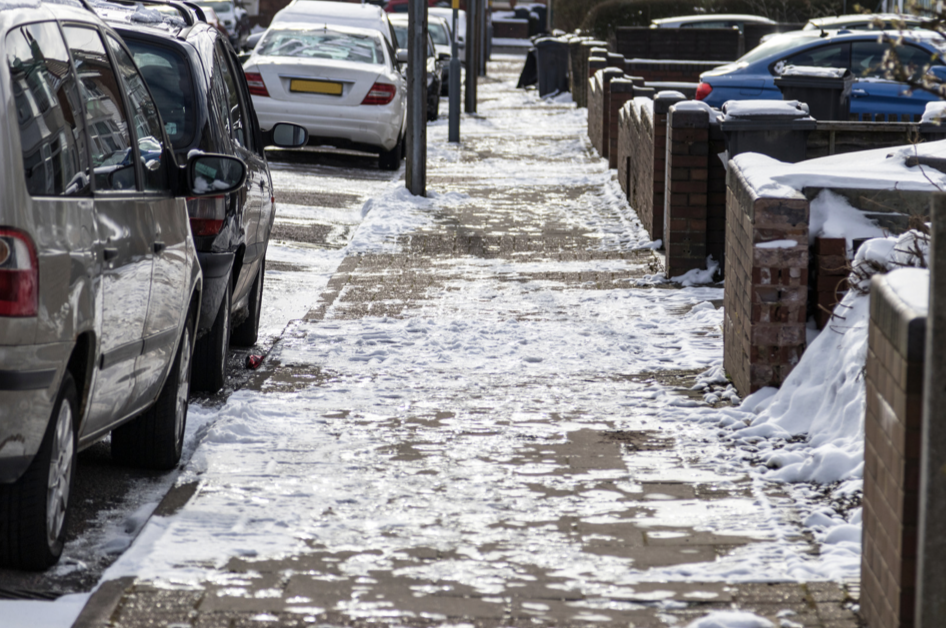Call Now For A Personalized
Case Evaluation
(267) 225-3317
Text Us Now For A Personalized Case Evaluation
(267) 296-4460
Free Consultation for Personal Injury and Criminal Cases
Free Consultation for Personal Injury and Criminal Cases

Roughly 1 million adults are injured in slip and falls in the US every year. In the winter, the rate of injuries incurred from slip and falls also increases, due to additional risk factors like ice and snow. These additional risks can be a liability for homeowners who need to maintain their property. If you are a homeowner, you may be surprised to learn that you are responsible for clearing snow from the sidewalk in front of your home. Consequently, if you neglect to clear the snow on your sidewalk, you may be liable for any of the injuries incurred on your property.
Philadelphia has experienced indecisive weather over the past few weeks, reporting spring-like temperatures as high as 60 degrees followed by freezing temperatures and brief snowstorms. Snowstorms are predicted to fall in the northeast as late as mid-March before warmer temperatures become more reliable. Inclement weather such as snowstorms, sleet storms, and below freezing temperatures pose risks for pedestrians navigating the city. Familiarize yourself with your local laws to avoid personal injury suits from icy slip and falls.
What are My Responsibilities as a Homeowner In a Snowstorm?
In Pennsylvania, homeowners are required to maintain the sidewalk adjacent to their property. While many slip and falls occur from long-term neglect such as cracked or broken sidewalks, inclement weather and snowfall can become a liability overnight by increasing the risk of icy hazards.
Section 10 of The Philadelphia Code outlines expectations for snow removal after a snowstorm. “The owner, agent and tenants of any building or premises shall clear a path… on all sidewalks abutting the building or premises within 6 hours after the snow has ceased to fall. The path shall be thoroughly cleared of snow and ice.” The path cleared must be at least 36 inches, or three feet, in width. If however, the sidewalk is less than three feet in width a clear path of just 12 inches is required. The code includes additional requirements, such as not piling snow on sidewalks, driveways, or the street.
Failing to clear the sidewalk outside of your home could result in fines from the City of Philadelphia. Yet, the risk of leaving an icy sidewalk unshovelled could be even higher.
It is important to pay attention to the local laws in your city or county. For example, while Philadelphia residents only have 6 hours to clear a sidewalk after snowfall, in Pittsburgh, homeowners are given 24 hours to clean their sidewalks.
Am I Responsible for Clearing the Sidewalk if I am a Renter?
According to Philadelphia code, you might be. If you live in an apartment building, the property manager likely addresses all property maintenance including sidewalk clearing. However, if you rent a single family home it’s a good idea to review your lease before assuming it isn’t your responsibility. If your lease requires you to maintain the sidewalk adjacent to your rental residence, you could be liable for any injuries that occur as a result of your neglect.
How to Prevent an Icy Slip and Fall:
To prevent a slip and fall lawsuit, you should prioritize sidewalk maintenance during snowstorms and when temperatures are below freezing.
Have You Been Injured in a Sidewalk Slip and Fall?
If you have sustained injuries after slipping on an icy sidewalk, you may be entitled to compensation. Attorney Crichton has extensive experience advocating for clients who have suffered injuries from other’s neglect, and will advocate for you. Compensation can cover your medical expenses, lost wages, and pain and suffering resulting from an accident.
Call (267) 225-3317 for a free, individualized case consultation today. All cases are handled on a contingency basis, which means that you don’t pay anything until we win your case.

Call Now For A Personalized Case Evaluation
(267) 225-3317
Free Strategy Session Available for Criminal and Civil Cases
Copyright©2024, Crichton Law. All Rights Reserved.